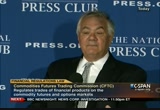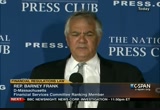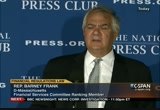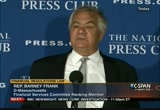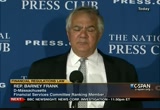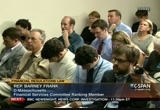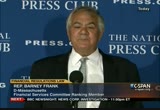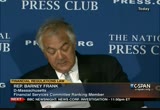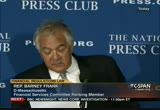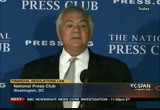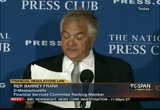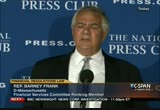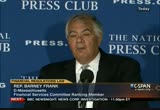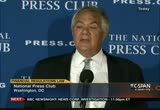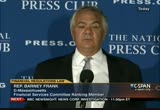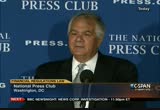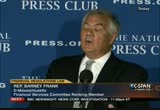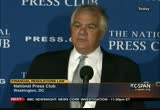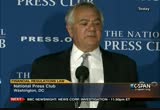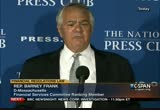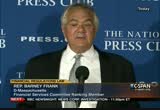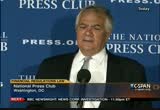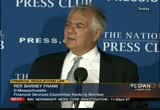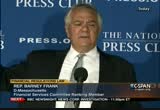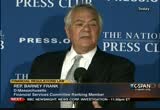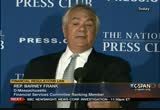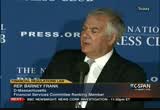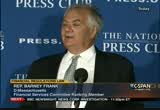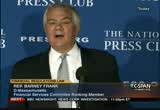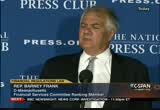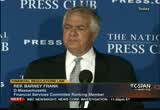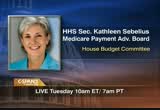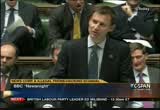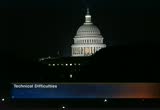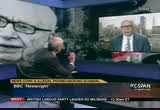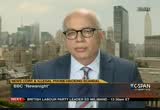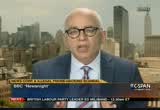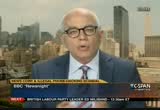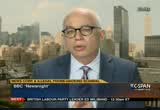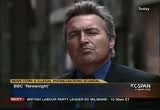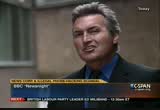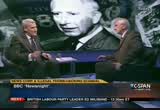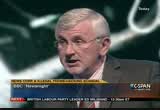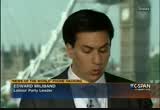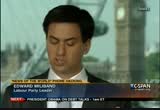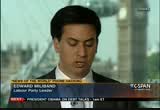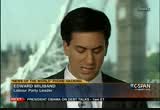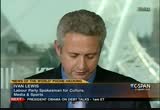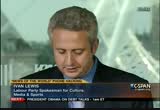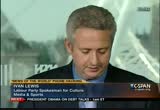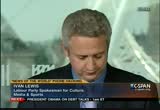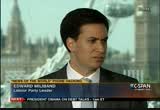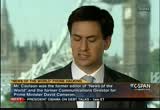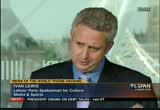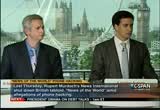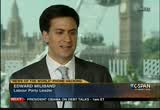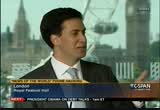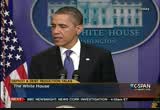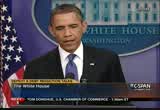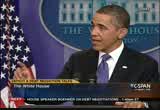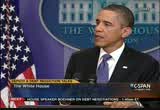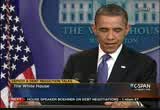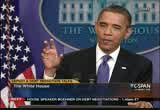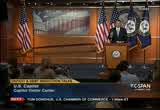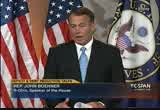tv Capital News Today CSPAN July 11, 2011 11:00pm-2:00am EDT
11:00 pm
11:01 pm
the purpose of it was to give their independence to the bank regulators. that is an absolute perversion of the constitution. there was a legislative power, and which we make laws, announcing they will not use the confirmation power until you get by that extortion were to can i get to the legislative process a perversion of the constitution. there is one final area that i am troubled by. some of my liberal friends are part of the problem. the single biggest cause of all of this was the ability of people to make mortgage loans with the deregulation or risk. we have dealt with that in substantial part. banks get unjustifiably on happy when people talk about other banks. if only those institutions
11:02 pm
technically known as banks, if only they had made mortgage loans, we would not have had the crisis we would have had. part of the problem is a couple of things screwed up. information technology revolution, it allowed institutions that were essentially unregulated to make mortgage loans. what you had was some banks were and it -- some banks were able to set up subsidiaries. because they were affiliate's of national banks because of the control of the currency did in 2004, they were not subject to state regulation either. that was a bipartisan mistake. a clinton appointee, who was the whole over appointee, he in 2004 over pre-empted and try to
11:03 pm
maintain control and direct contribution to work -- contradiction to what the bill says. the problem was that people were able to make loans without regulations. the soft part of that problem under the legislation -- the consumer financial protection bureau has jurisdiction over activity. >> so we have dealt with that. there was a second part of it. i believe that will be well done. they have the ability to put requirements going forward.
11:04 pm
we can't prevent that from happening again. there was another aspect to it. if people do not have an incentive to make good mortgages, mortgages that can be repaid, you are going to have trouble. that is why risk protection is so important. i in trouble because there is an assault on a risk protection. i believe that 20% requirement is higher than it has to be. unfortunately, some of my friends in the advocacy groups are involved in this. there is a sudden shift in which people have stopped objecting to what is involved in the mortgage as an exception. instead, they tried to claim it should be the rule. there was a general motion that it is too burdensome. the combination of the rules and risk protection meant to could not get mortgages. i was just reading the testimony
11:05 pm
before the senate and which this was created. his testimony to allow it to go forward is in 1986. if you listen to these people, you have to wonder how we ever got any mortgages made before 1986. if it is essential to mortgages and risk protection, what were all these people living in before 1986? "we are trying to do with derivatives, putting them -- with ag and goldman sachs do with each other, we do not believe it should be allowed to do the things they did before. risk retention, these things are deceptive. that is what you're hearing. we have not done it this way. it might be harder. it might cost us more. yes, it is destructive.
11:06 pm
we had to disrupt a rotten system. we had to disrupt a system that collapsed. it collapsed because of risk was appeared to be made to disappear. people were able to engage in activity which they did not have any risk. riske did not go away. it just exploded on all of us. risk retention is a very important piece of this. i was ordering was some people in the mortgage bank, they said, yes, we had risk retention. if you read the paper they do not like a very much. they want to be able to sell securities that include some that meet the qualified mortgage said and some that do not. they want it on five years. this assault is a terrible idea. let me just read a summary of what people say about this.
11:07 pm
nobody disputes -- here is what people are complaining about. forbidding banks from signing up borrowers for overly expansive lawns, reporting banks to make sure the consumer has a reasonable ability to pay the loan, in the long -- overly expensive that loans should be banned. here is what we are told about this set of regulations. risk retention requirements and specific bands on types of mortgages. for all of the demonizing of about 80% of even subprime loans are being repaid on time, and another 10% are only 30 days behind. most of these new homeowners are
11:08 pm
low income families, minorities, who otherwise would not have qualified for a mortgage. mr. frank's legislation ensures that these are issued in the future. in the bill could not come at a worse time. it would have feet york are worse. -- fewer borrowers. i am reading from a wall street editorial from 2007. they were talking about how wonderful the subprime loans were performing in november of 2007. having the wall street journal criticize others for subprime loans is kind of like "nes of the world" accusing others of not being respectful of privacy. the fact is, these criticisms that they made a back then are unfortunately being repeated now.
11:09 pm
there is an overwhelming consensus that securitization without risk retention, which will never go down with taxation without representation, i understand that. it will not work. but as a consensus, read michael lewis, it was the ability to make risk appeared to disappear. to get it out of your site. the solution to that puzzle game as a technique known as securitization. the economist talking about the dangers that might be in exchange traded funds says, "this has echoes of the subprime housing crisis. it had its origins -- this is a couple of weeks ago.
11:10 pm
it was intended to reduce risks. as i said, some of my liberal friends are joining in. mortgage is not subject to risk retention are to be an exception and not the rule. the notion that you cannot have mortgages without securitization and you cannot have securitization a fee of risk retention is wrong. before 1986, but this understand that. we had pretty healthy housing market in america. secondly, it is a very important tool. a notion that people who are making these laws should retain a 5% interest in the loans as a guarantee against the making loans that do not have a chance to be repaid, that is an impediment.
11:11 pm
if it ends, then we have -- i have been told by some, it is a problem if you have two types of loans. some which are subject to risk retention and some that are not. that will be bad. if they believe that, let us do without those of risk retention. before 1986, you held 100%. i remember being told by some of those that we cannot do that. why ask why? as 5% so much of a problem? we do not have the capital. if you do not have the capital, do not lend it. do not lend money you do not have. it is like "the wall street journal." these subprime loans are wonderful. you would drive low-income people out of the market. i ran into a dry run into much of this decade and before. the motion that for many of these people in the lower income
11:12 pm
brackets, a decent rental housing is preferable to putting them into home ownership situation is precarious, it is a hard one to overcome. it is interesting, you have assaults on the bill now. you have this effort to undermine the rules on derivatives, to postpone any until 2012. recently, several publications noted the fear that american financial institutions have sold credit on greek debt. we have hundred billions of dollars in liabilities that we do not know about.
11:13 pm
the bill has not come into effect. people are still trying to postpone it even further. the uncertainty is in and of itself a problem. we have speculation, the spokesman for the republicans on this is jack kingston. he has clearly said on the floor a couple of times that speculation has no impact on energy prices. by the way, there was a big argument on at in "the economist." what has happened is, information technology greatly increase liquidity has transformed that. there is not a consensus within the financial pages that people talk about the impact of speculation. it is a given. republicans are trying to keep them from doing anything about speculation. those are the had on a tax that we have. there is a more subtle one, this attack on a risk retention. i believe that risk retention is the single most important piece of this bill. you know, the response when we
11:14 pm
used to say there was a problem, what was supposed to be the substitute for risk retention -- the rating agencies. the rating agencies were the ones. you did not need to have the latter worry about this because you could go ask the rating region -- agencies. now, the rating agencies are trying to overdo it. the people who told us that subprime loans were good are now telling us that it is not good. i think they were wrong in both times. that is one of the things that i really wanted to address now. it does of all me and an argument with my liberal friends. 20% is too high. i read the mortgage lenders, they do not like a down payment requirement. they are against the debt to income ratio. and they are against the loan to buy the ratio. they should find out how much people -- money people are
11:15 pm
making to make the laws. why? if it is not relevant to what the ratio of that income is to the deck, the value of the home is not relevant and any down payment, and your security rising 100% of the rest, yes, it is important that we do what we did. do not reduce their risk retention is the only thing. i made a substantive change. we ignore the wall street journal editorial in 2007 because the build up their work proposing and which passed the house and not the senate at that point was incorporated into the bill. their fears that subprime mortgages will be given, i hope they turn out to be accurate for once. on the question of risk retention, we now have no unregulated mortgage lenders, and we have banned that practice is. they will be subjected to regulation. but particularly those that point out correctly that regulation cannot replace the market, should not be advocating that we do with the rock -- the
11:16 pm
one market-based incentive that is a born here -- that is risk retention. it is a market based incentive. it's as put your money on the line and everything will be ok. i am disagreement with some of my liberal friends again. risk retention -- loans but without risk retention should be an exception and not the rule. if people are convinced, i am for all with doing away with the exception and not the rule. >> on the one year anniversary, what would you say are the three most important outcomes from your perspective? >> i am always puzzled by the three most and the will single most, nobody ever looks at their life that way until they are asked by the media.
11:17 pm
i will say there are several important pieces. i think i have just touched on them. risk retention, derivatives, maybe it is a combination. the loans made without any consideration or without adequate consideration of rest, they were the bullets. the guns were the derivatives. both sides of the derivatives. the derivatives on the positive side, the credit default swaps on the negative side. we met a bunch of loans that should not have been made. we have sophisticated ways of ricocheting that all over the world. people got hurt by that. independent consumer bureau was very important. those are the two most important source -- systemically. in terms of public goods, we never said the bill was only to deal with the things.
11:18 pm
i think the consumer bureau is a very important innovation. another one is, we did the bailout situation. republicans in the face of all evidence argue to the contrary. as a matter of fact, the acting comptroller of the currency and the speech she gave, one of the most controversial things, i do not think it got a lot of attention. i was reading on the plan yesterday. he kind of complaints about the fact that we are not going to have publicly funded bailout. he said in the next to last page of his speech, you know, we need a banking system. there has to be a safety net. the public should be willing to pay for that. that sounds like putting it back in the business. we had other people complain about the testimony about a former treasury aide said that
11:19 pm
we took away the federal reserve's power under section 13.3 to do away with aig. we've made it illegal to spend money -- public money to take care of a financial institution. we can pay money to pay off some of its debts if necessary, but none of it goes -- i think that was very important as well. >> i just want to remind you to state your name and your organization before you ask questions. >> how is it that even after it got-franc passed, they do not what the exposure that they have? >> the law has not fully gone into effect. that is exactly right.
11:20 pm
we passed the law when year ago, there are rulemaking -- you do not go to suck that carry these things out to be phased in. that is what i talked about. >> when will that happen? >> within the next few months. that is precisely what i was talking about. if they had been fully funded in february or march, we would be a lot further along. if the republicans had their way, we would know before october of 2012. we hope to be able to get that within the next couple of months. that is precisely what the bill will do what it said it is fully in effect. >> [unintelligible] >> the people i represent in
11:21 pm
massachusetts near the same share of the burden for whatever financial cost there is, but if you drop below they do not get much of the benefit. the most variable prices in america is the housing price. to have no recognition in federal policy of variations in housing price makes no sense. is, we want to ban of luxury housing. but if you do not have loan limits that pay attention to median house prices, you do not get that. the second argument is this is a baton from the stimulus standpoint. the secretary of treasury was saying just that. there were some stores are a while ago, it was terrible people can get house is that such and such a price. now, the stories are how terrible that they do not have it. there is no right answer.
11:22 pm
this is a very bad time to be cutting back on housing. the basic point i want to make is the equity argument. to treat the whole country as if it were one -- let us put it this way. if the level is too low in one place, you get in and fairness to those people. on the same level cannot be right for the entire country. for san francisco and mississippi. the federal government does take into account the cost of living in some cases, but house prices again her the most varian. it would be especially a bad time economically to do that. it is also an equity matter. >> what hurdles to you think the administration will have and appointing a new commissioner, and will there be a sense of urgency? >> absolutely. that is another part of the problem is speculation.
11:23 pm
i believe he would like to move on position limits. he does not have the three votes to do right now. the hurdle he will encounter is the extra constitutional use of the filibuster the notion that a majority in the senate needed to pass a bill is 60 is a very recent thing in american history. as a matter of fact, it is an extra -- the constitution clearly assumes that majority rule will govern in the senate. there is a principle that lawyers have that is often stated. it is, the existence -- the statement of an exemption proved the existence of a row. people say the exception which they say if this is something and it is wrong, it is not wrong. the work. if you say something cannot happen and it happens, it happens. what this role is, if you say
11:24 pm
something as an exception, that intense the rule. if you cannot do something on sunday, the assumption is he doing on every other day of the week. if you read the constitution, there are several places where it says that in the senate you need more than a majority. you need two thirds to impeach. you need two thirds for a treaty. the fact of the matter is that the constitution says you need two-thirds of those cases means that you need a majority in every other case. any court interpreting any law will say that. but they have now grafted onto this this requirement of 60. now, if you have republicans announcing that they will use the confirmation power not to say that point is a good, we do not like the law so -- that maybe the problem with it. and in which case, the president has to use a recess and women. for the republicans to announce
11:25 pm
it will not confirm people, it is kind of like a pyromaniac setting off a fire and then complaining when people use the fire door. they come to the created the emergency. >> use a 20% -- >> i would sit down at the low single numbers. another thing is i would say there are other factors. i think you could have a minimum of, set, 4% or 5% and and take other factors into account. i understand if it is 4%. some people will not be able to buy houses. that is the problem. you have to help people with their income. not pretend to have the income they do not have appeared we have a serious problem of income inequality in this country. that is very important to me.
11:26 pm
a minimum of 4% or 5% will be reasonable. >> making risk protection -- risk retention apply to all? what's the me repeat. let me repeat what i said. there are people who argue -- by the way, the bill that came out of the house originally, it did not have an exception. i thought it quiet exception was a good idea. people getting that try to bootstrap it and say that it was a bad idea because it would be a market that is unfair to poor people. i believe we can live with a jenny one exception. but if people are convinced that an exception is deleterious,
11:27 pm
that i am for no exception. i very much agree with her in general. she has been an important guide to was. i am prepared to accommodate an exception only as long as it is an exception. if that cannot be done, we will go back to the way is to be in america. >> would you think what the republicans call more cost- benefit analyses -- >> of them would of been done. a year ago, we approximated -- i
11:28 pm
am not happy that they're taking their time. if they had been fully funded, and january, the democrats, we're talking about $200 million. what is happening and said it's a and b. we would have been much further along. i think doing cost-benefit analysis is a good idea. he should not hold off on it. i would like to see some cost- benefit analysis on infrastructure and afghanistan at some of the other things that they are for. i think it is a reasonable thing to do. as long as the cost includes, of course, the financial crisis and the terrible lost revenue in jobs and tomorrow -- that is the
11:29 pm
cost. i noticed that alice sloan has come out with a reanalysis that will be printed in "fortune" about how much money we have made over the intervention. the combination of the tarp. his calculations are it made a hundred billion dollars for the federal government. >> there has been sent criticism of a not driving more clarity at this point. i wanted to be your view on that. just as it related question, he talked about bailouts being over. if citigroup were to go out and finds, are we to believe there would not be a bailout again? >> first of all, i will not
11:30 pm
comment on any specific financial institution. none of us have any reason to belize city is in danger. you have -- my first couple of weeks, i talk like a normal person. here i am affecting the market. obviously, i do not talk about citigroup, but i will say this. the reason i say bailout is this, if you mean the kind of intervention that kept a i.t. going -- a i g going, no. the law is very clear. if any large financial institution whose demise would have broader consequences of fails, that is well -- where the
11:31 pm
death panels come in place. that institution is dissolved. shareholders are wiped out. executives are fired, and in fact, they will may have to pay back some of their last two years of salary. there is nothing -- the institution is over. then the question will be for the federal officials -- of that institution paid none of its debts, would then have the fax that reverberate throughout the economy in a negative way. if so, the institution is empowered of the lot to pick and choose and pay as little as a necessary to avoid further damage. it is a model they have found for some time in banks. what thank -- what hank paulson asked for in the spring of 2008, he predicted it -- and this is the case -- he had a choice when lehman and aig. as he read a lot at the time, he
11:32 pm
either paid all of the debt or none of the debt. he paid none of the debts with lehman, all with a i.t.. both are bad situations. yes, there is an ability on behalf of financial institutions to make some payment of some of the debts. the camp a part of some of the debts. every penny of which must be recovered by an assessment of large financial institutions. any federal official unless there is a state in the statute who what it chance money to deport those institutions going would be committing a federal crime. the other one was the federal reserve which had the power into section 3 of the federal reserve act to deal of aig. is gone. what is going to happen? the fed is now going to be able to set up a facility for institutions that are solvent but liquid did to comment
11:33 pm
collateralized with the other assets to get some liquidity. has to be a facility which of the * -- by the way, what is widely now acknowledge. some people are saying it is a disadvantage for us. the public has got to be able to pay a acknowledging what the public will not pay. live. >> i have not heard anybody who thinks the to the answer is, no. they will get it resolved. i hope the senate will soon -- i was critical they did not nominate quicker. we've made a jig we worked very hard to. because of the historical accident, no federal regulation -- no federal officials had --
11:34 pm
we worked out a system of a federal charter, we were able to finesse that and got a solution that was acceptable to the insurance industry's to have a couple of people representing the insurance industry, that will be very helpful. i sedition not be able to go forward. i think that is very temporary. i also believe, says a lot does not do it. the question is volatility and leverage. nobody wants to be systemically significant excess people who have to be. i think that is a very temporary thing. it will be resolved by the end of the year. >> what do you think has been the impact of financial regulations? d think it has led to weaker
11:35 pm
legislation saks >> no. i think the biblical providence -- the impact they have had unfortunately has been on the financial situation. they have had an impact by having the sec under funded. that is a serious problem. nobody has taken the legislation very seriously. if they have helped in this sense, it may have helped make the program better. one of the programs that they specifically try to repeal, which is one of the ones i am proudest of, providing assistance to people who are having mortgage problems not because they make at mortgage deals, but because they have been unemployed for a long time in this economy. they wanted to repeal that. that has just been implemented.
11:36 pm
in fact, if you look at the programs that try to get rid of, the have gotten better and stronger sense to have tried to get rid of them. the only impact they have had is not to the legislation, the other one by the way, we have had a serious psychological phenomenon. apparently, there are cases were going from the minority to the majority has a severe affect on your memory. one year ago, the republicans knew exactly what to do about fannie mae and freddie mac. at the conference committee, they offered an excellent bill. we did not accept it, they were furious. is that this is crazy. we cannot wait. that was over one year ago. today, we have not even have a hearing. the republicans knew exactly what to do about fannie mae and freddie mac when they were in
11:37 pm
the minority. gaining the majority has modeled their minds. we now have four republican approaches to fannie mae and freddie mac. we have the hands and bill which is not had any hearings or action. we have the john campbell's bill. i think the committee has been ineffective. >> right now house republicans -- are you concerned at this 2012 elections could make these more threats to the law? >> know. i do not think that they are going to win the house, the senate and presidency in the 2012. you also need to get the white house. i do not think so. i also believe there are more ready to do this -- this is a case -- they are not in the
11:38 pm
minority in the house. i think they're bluffing. i do not think they are ready to pass a law that says they cannot deal with speculation. i think most americans think that -- i do not think there are ready to abolish it and put it back to the banks. i think they have a situation where -- the have the luxury of telling their lodges supporters that they are abolishing fannie and freddie and letting it be a free market. but the realtors and the lenders and everybody else knows that they cannot do with. there's still the guy starling at the bar at somebody much larger than he is at the knowledge that his friends are holding him back. with solid in the house, they became the majority.
11:39 pm
their friends let go of the code. now, they are single, will not let them do it. >> what do you hope will be the impact once it starts up? what are the consequences of starting without the senate confirmed it? >> confirming the director is not a problem. if you're not going to confirm anybody, you cannot reject a people act that way. we do not have a lot of bad mortgages being made now because people are still in shock. i see seeds of problems. i think a good director will mean of -- a lot fewer bad mortgages will be issued. i think that will be very helpful. i think consumers will find that they're treated much more fairly. we have already seen that. credit card act we passed had a very good affect.
11:40 pm
no negative effects. he will see consumers much better protected in that regard. he will also see -- the community banks stand to benefit because they are unregulated competitors will not be regulated by the same rules that regulate them. it is one of the reason some of the community bankers have been the antagonistic. we have this terrible situation where rigid i do not know how a originally happened, the real- estate settlement protections act -- there will be less bureaucracy. i think it is a very important one. the testimony of people -- one of the things we did was
11:41 pm
consolidate their requirements. they did not exist. that is systemically important. >> i was just wondering, you mentioned the push back from the ideological gop. where are using the most push back from the financial industry. producing areas where they have influence? >> one area where they are doing the most which i think is perfectly reasonable is making sure they're not putting it in a national disadvantage. sometimes of course all that. i think they have a good case. the forceps city eerie doing derivatives business with another foreign entity -- a holy funded entity, not an american one, and the situation in which the people in that country do not have to put
11:42 pm
margin requirements on. we have to make sure the institutions -- there are other things you can do. i think that is a reasonable issue. i think they're trying to make sure that the role is not done any way that is harmful. my own idea is it is not shorter or less. we are not banning the activity as much as the purpose of the activity. that can be a little bit tricky. beyond that, those are the two major ones that i have seen. i take it back. there is a third one. the thing i have heard the most about personally is the one that confirms we have ended a public bailout of large financial institutions. some people are automatically going to be systemically important because there are banks with over $50 billion in assets, etc.. goldman sachs, wells fargo, bank
11:43 pm
of america. you have others, insurance companies and mutual funds. any institution in which there is some ambiguity as to whether or not it is systemically important is not -- you have one hearing. i asked by regulators, has anybody ask you to be covered? they said no. i take -- and i am confirmed by that. it is not an advantage. not a license to get funds as much -- that does not mean i agree with everybody who does not want to be named. >> just to follow up, what is the concern as far as -- >> to set it would be able to do what it wanted to do. that one is sort of binary. the other one is this, the
11:44 pm
activities that the rule tells them not to do our activities which they could do if they were doing it for customers. there are saying, sometimes they do it for a customer. you cannot do it only for customers, you have to do a certain margin or you're doing it for yourself. i think that is reasonable. but at the amount that the eritrean paul himself said, i will know what i see it. there is not a a big line at between permitted activities. >> can you balance that between what is in the law or the need to change a lot? >> even people who had not been there understand that is one of the things we negotiated in the conference. people understand that the statute gives the regulators the ability to do that. >> you mentioned at the beginning the international impact.
11:45 pm
could you speak a little bit about that? >> the british are now talking about a resolution regime that looks a lot like ours. i think we are hoping our resolution regime is the moderate simply on derivatives, there are examples where america has moved ahead. it is in a way that we think other people will join. those are two examples where i believe you're going to see this. now, it is interesting. the article did not mention exactly, but and "the new york times" on saturday, there is a union why consumable. that is not a universal code. that is another thing. the resolution regime and drive this. now, i had this conversation s secretary dieter did, one of the things that happens with
11:46 pm
resolution and multinational financial institutions, i think the general rule is that the host country will have the right to have its rules prevail if an american institution has to be resolved -- resolve such a nice euphemism. dissolved. hist that has to be worked out, that has to be a combination. did i get that right? yes. it is not going to be all that easy. the notion, again, america is in the forefront. we are the first nation to say, hey, if you get in trouble, you are dead. we will then worry about your mass. we may have to minimize the mess left behind, but if you that
11:47 pm
costs us any money, it is coming from your colleagues. it is not coming out of the taxpayer. we think that model is an attractive one. again, the incentive is this, when i became the chairman and waiting in 2006, there was a consent that all of the ipos were going overseas, mayor blubber was concerned. there was a notion that -- mayor bloomberg was concerned. and some of these other practices that happened in america. what you now have is -- i am very strong. my choice of public policy has been more domestic.
11:48 pm
over the last four years, i have done a lot of international stuff. working with the european union, working with all of the international -- the met with japanese, canadians, others. by last year in the year 2009, things have shifted drastically from countries thinking how can i lower these others to, what can we do together so none of us get hit with all of this crap? that is why i am encouraging it. >> you talk about appointments and other insurance related positions. and that the director of the federal insurance office just about this last month, and the third appointee that was just nominated this month. do you see any concerns with how the could be approaching insurance related issues?
11:49 pm
elaborate on that. >> as i said, the question was, was i worried about them taking too much time? i asked them to slow down and not make a charge related decisions until they have representatives. the three appointees -- by the way, where's the guy for missouri, who is on the -- yet. i agree with him when he testified. he has been restricted to much of what he can share with his colleagues. he is their representative. i said at the hearing, i thought they were being too restrictive there. now we have three very good appointees.
11:50 pm
i thought i would think he would be one of the least controversial appointees. i would think he could give voted in right away. i wish the administration of -- i wish at the administration would move faster. i wish i could lose weight. i wish a lot of things. at this point, no harm no foul. there was a massive change in behavior. it is destructive. we set out to disrupt the financial model that has been disastrous. we believe it is a very pro market model. i am confirmed by that. nobody has pointed out any great problems. this is april market model. putting people in exchanges. that is pro market. we have no price fixing here. all that is moving forward, and there is a lot to be done once complicated by the fact that they were not funded well.
11:51 pm
the employment process was slow. when a noble prize-winning economist and a bipartisan are brutally rejected by the senate, that is part of the reason for the slowdown in the process. i would wish the president would have nominated him anyway. but to go back to your question, they have appointed three good appointees in the assurance area. no bad things happen as a result of the delay. i think it would go quickly going forward. >> thank you everybody. we actually have gone over our time. i hope you have had your questions answered. thank you for coming. [captions copyright national cable satellite corp. 2011] [captioning performed by national captioning institute]
11:52 pm
>> chaka fattah joins us. he will talk about his proposal to overhaul the tax system. then, bill miller on jobs and the economy. after that, michael abramowicz will explain why some people view that president obama will declare the debt ceiling unconstitutional because of the 14th amendment. 7:40 5:00 a.m. on c-span. kathleen sebelsus on how to
11:53 pm
make recommendations on how to bring down medicare costs. 10:00 a.m. eastern. police have said that former prime minister gordon brown may have been a victim of phone hacking by an investigator working for rupert murdoch's newspapers. more now on the story from bbc's newsnight. >> it is like an entire enemy in system going into violent reaction. suddenly, those he wanted to smile on him find rupert murdoch's -- >> i think they should be focused on clearing goes up rather than on the next corporate moves. >> the affliction spread as other news international paper's are accused of invading the
11:54 pm
privacy of gordon brown and his family. we have new details on how boredom brown reacted. it happened at the moment of rupert murdoch was supposed to take a bigger role in british life. rumors swirling around a news international this afternoon are that to save the sky deal, rupert murdoch might drop all of his united kingdom newspapers. more accusations that the police were corrected in exchange for information. also, enough air-conditioning to pay for football in the desert. how did a country persuade fifa to have them play the world cup. >> it fits the prejudice that people have in their mind. an arab nation could not have one.
11:55 pm
-- won. >> nobody was safe from corrupt journalists. there were allegations today that they tried to pack the funds of members of the royal family. reporters had to details of his son's medical reports. david cameron stood by his decision to appoint the former editor, andy coulson, as his communications director. there is no sign of the scandal at diminishing any time soon. >> today, the hacking story moved on with new victims gordon brown and his family. new charges against more rupert murdoch newspapers. and the exposure of more unethical members of the press. the brown revelations came from investigations by the bbc and "the guardian."
11:56 pm
the first relates to a flat to mr. brown bought in 1992. eight years later, the sunday times ran a story suggesting that it was bought for a knock down some. the bbc has received a tape of a call that seems to suggest how the details were obtained. >> i wonder if you can help me. -- >> the caller is known to have been working for "the sunday times" at that time. and other charges also from 2000. somebody got details of mr. brown's account.
11:57 pm
the award mr. brown that somebody was pretending to be him. "the abbey" never got stone proves that there were behind the calls. the worst charges concern his son, fraser, who was born in 2006. this said that his son had cestus fibrosis came from access to the baby's medical records. >> many members of the republic, i am shocked and horrified at these allegations that people could do this to court and or his family. it is extremely serious and it needs to be looked at. >> tonight, gordon brown said his family was shocked by the scale of law breaking and intrusion into their private lives. he is expected to do an interview tomorrow. >> it all seemed to happen today in one extraordinarily mad rush
11:58 pm
around 4:00. not one after -- not long after those allegations started trickling out over the internet can the extraordinary news from news corp.. they are withdrawing their undertaking about spinning off sky news. that is only minutes before germy hunt was to address mp's about the future bid for sky. at the same time, david cameron was 6 miles away fielding questions from journalists. >> and the prime minister sent a clear warning, do not think you are taking over sky until you clean up your act. >> all i will say is this, if i was running that company right now with all of the problems and difficulties and the mass that there is, i think they should be focused on clearing those up rather than on the next
11:59 pm
corporate move. that is the view i would take if i was running that company. >> back at the house, it was ed who wanted to grow cameron about sky, but he passed the issue to jeremy gaunt. now, hot suddenly had to cope with the dramatic news from the murdoch's. >> i understand in the last few minutes, news corp. has withdrawn their undertaking in news. on january 25, i said i was minded to refer news corp.'s merger with bksyb to the competition commission in the absence of any specific undertaking in the news. as a result of news corp.'s announcements, i will be writing to them to pass the news. >> what was cameron not there to
12:00 am
answer questions and softbacks labor wanted to know. >> mr. speaker, the prime minister was wrong not to come to the house of commons today. as on every occasion during this practice, he has failed to show the necessary leadership the country expects. he saw no need for a judicial inquiry. he saw no need to change course on bskyb and he has failed to come clean on andy coulson. >> some tourists think rupert murdoch should not wait for the commission but the ditch the bskyb bid altogether. >> i know it is unusual for people in his position to behave. [unintelligible]
12:01 am
12:02 am
watching. we apologize. we hope to return to the program shortly. >> we have been talking to a senior colleague from his days in downing street. we told them how the office received a phone call that somebody from the sun, they had had a tip from the infirmary. betty had cystic fibrosis. this was in the middle of the big prepositions of the pre buzzer report with gordon brown. gordon brown reacted very badly. how did they now? where could -- where was the public interest? he was not going to allow them to make a story out of this sun's elements.
12:03 am
he was concerned the story should come out and a positive way and not tragic or heartbreaking. mr. brown wanted to issue a pre- emptive statement to stop the sun from coming out with an exclusive story. rebecca brooks, the editor of "the sun," got hairy. there was no justification for a statement. this is the not the way things were being done. she was frightened gordon brown was going to stop exclusive. in the end, "the sun" managed to get the story out by being interviewed on the sky news. jordan -- gordon brown issued a positive statements. >> thank you. george it used to be the press
12:04 am
secretary. you're a good friend of court in brown. how significant is this about his son? >> i did not know about it until i saw today. i would not want that kind of thing about my children slept all over the papers. i would be upset if it came out. it is another tragic story in this side of it is not over. >> and yet, he still went to her wedding. >> another weird thing about politics. you're on that treadmill . he has a lot of people behind him. i think he probably did not want to go but felt he had to. he would have to ask him why he went. >> this relationship between politicians and this media empire is being increasingly exposed.
12:05 am
>> the good that is coming out, we have to get the criminals in jail but the good is that those days are over. the familiarity between these people is going to be reduced. if you ask for the prime minister's diary, if he goes downstairs it is published. if he has a pop -- private meeting it is private. those silly arrangements have got to stop. >> is a vacant -- turning point? >> it has been a decade of swaggering editors cutting across editorial positions. it has been counterproductive. it has undermined paternalism. if what comes out of it, is a framework or we have the kind of regulation, i think there could be a good outcome.
12:06 am
>> there is nothing new about this. this has gone since newspapers began. >> it does so is been wrong. when david cameron first became a leader, -- >> why did the hiring andy? by hiring a tabloid editor? >> what happened is in 2007, there was a feeling that there was going to be in the election immediately. gordon brown would do everything to get headlines. there was a modification to that approach. that may have been wrong. >> id is an abandonment of what you said. >> not putting an arm's length. >> it was a mistake.
12:07 am
>> in hindsight it was. all the parties have had a problem. there are telling tony blair we needed to do something about the media. there was a time where there was a consensus. but now, if nothing good comes out of this, it is that we will have tougher regulation. we can put the profession of journalism into a higher place. >> everybody is embarrassed at a time like this. let's try to talk about practical mechanism is about how this relationship has been the dominant feature. this relationship between a particular media empire and the politicians ought to be reconstructed. >> get rid of the pcc and rebuild it. you need sanctions, people who
12:08 am
volunteer so when an editor makes a mistake or is guilty of a wrongdoing they can oblige the paper to put it right. you need more transparency. these cozy meetings need to -- >> should there be a requirement that public? >> the meetings between -- it is completely unacceptable. >> and there will send some flunky. >> they may try to get around the rules bar right now rupert murdoch can go in the back passage and no one knows about it. that is remarkable. >> you have to separate policies from their editorial decisions. in broadcasting, you do not have proprietary to tell you what to do. there is a proper code. there are big fines otherwise.
12:09 am
>> the only tarnished outfit to come out of this is the police. they're both incompetent and some of them, corrupt. what should happen to commissioner yates? >> he was tasked to review the evidence within the science that some phones have been hacked. he said there is no new evidence. his position is untenable. he should resign with dignity. >> that have a question to answer, the police. they had access to them disinformation. >> do you have confidence in john yates? >> i do not. >> do you think he should resign? >> his position is not good. >> thank you. commercial confidence in rupert
12:10 am
murdoch is leaking like a sieve. shares in bskyb dropped today. there have been some who have been sane and decent. they are outnumbered by the william randolph hearst and conrad black's. murdoch claimed to be something different, a newspaperman who was a multimedia tycoon. but he never surrendered his personal control of his empire. that is increasingly seen as part of the problem. >> rupert murdoch sits atop a complex british arm of his operation. his son oversees european and asian interests including news international, the company that owns the sunday times and the news of the world. james is also chairman of bskyb. they want to own it all.
12:11 am
not just 31%. they have sacrificed "news of the world" to get the job. it was clear that this was not going to go anywhere near assuaging the anger. the only reason they have not been crawling over the deal is that news corp. had bought them off with an undertaking. they were going to spinoff sky news outside of their control and limit the amount of the british news media that they were in charge of. this afternoon, they withdrew that undertaking, triggering that competition commission investigation that they had been working so hard to avoid. why would they do that? the answer is, given where they are, given the position they can see going forward, getting a competition investigation is about the best position they can
12:12 am
hope to be in. >> i think they're saying, let's give it time. hopefully that will deal with questions as if -- but they have a broadcasting licence which has been in the minds of everyone concerned at the moment. once at progress, we will hopefully find in favor of the acquisition. then we can slip under the radar without anyone complaining. >> the question if executives are proper people to and be involved in broadcasting is another headache for the company. it is a question to be judged by -- stewart was in charge of broadcast content and standards. >> if you were to decide today the members of the board, because of their connections with news international, that there were not fit and proper people, how can they hold the license today?
12:13 am
what is going to be done? beside the acquisition. >> the american side of the murdoch empire might also prove problematic. now running dow jones and the wall street journal, he was in charge of the news international, the bride's paid to police officers. even if he had no knowledge of these payments, news corp. could still opt out of the foreign corrupt practices act. >> under u.s. law, an entity can be found liable for a violation if anyone within the business organization, acting within the scope of their employment, makes payment intended to benefit the business organization. there are two prongs of this and the days -- investigation from the u.s. standpoint. the corporate level and, perhaps, as to any culpable
12:14 am
individuals. >> james murdoch could be vulnerable, too. he approved huge payments to the victims of hacking. >> you embarked on a cover-up because you knew how terrible it was and you did not wanted to come out. >> there was a particular settlement that i authorized. i said it was made with information that was in complete. i acted on the advice of the executives and lawyers. that was a matter of real regret for me. >> the competition commission baez the murdoch's time. time to do what? the rumors swirling around the news from this afternoon is that of that title might be the subject of the next drastic move. >> this appears to be a time warp. it is about the murdoch heritage.
12:15 am
rather than the future of news corp.. i am not suggesting it happens today or in five years, but maybe there is a post rupert murdoch moment when the ties in the york want to make a different kind of company. >> remember the only ground the competition commissioner going to judge the sky deal on is plurality, its impact on the number of distinct voices and british news. if the murdoch empire gets rid of its british newspapers, the plurality problem goes away. >> michael wolff is a contributing editor to "of vanity fair." he knows rupert murdoch better than most. he joins us now from new york. this talk that we hear on this side of the land take that murdoch might get rid of all his newspapers in order to concentrate on television, does
12:16 am
that make sense to you? >> we hear it here, too. we are securing the voice of panic. nobody knows what to do. every scenario is open for discussion. there are also, there his budget has been a faction that says, why do we have these newspapers? british newspapers, it makes no sense to us. we on a lot of businesses that are growing. that business is shrinking. this becomes a political moment to say, let's give read of them. i also think in a more general way, it is looking at this crisis and saying, we are really in trouble. how do we continue to run a the the news international? so many of its executives are utterly discredited. >> are you referring to members of this family?
12:17 am
>> i am referring to rebecca brooks, to james murdoch who has suffered an enormous loss of credibility. >> is part of the problem the way in which rupert murdoch runs what is a public company as if it were a private fiefdom? >> that is a question that is coming up more and more. this is an issue of governance. that is a question that will have to go to the board. we now have a situation where the murdoch's are not accountable in conventional ways. we have a situation in which people named murdoch are suffering a hemorrhage of credibility. i think they are at the point where this hemorrhage has been so great you have to ask, are these people who ought to be
12:18 am
running a public company? >> he is a pretty old man now. 20 years down the road, is this going to be a company controlled by murdoch? >> i matter of months down the road, this may not be a company controlled by somebody named murdoch. >> that you have any insight to why he is so protective of rebecca brooks? >> i think it is a a family issue number one. the murdoch's see this as a family company. the first issue is, what is good for the family? rebecca is close to james. she is close to her -- his daughter. i know that murdoch and rebecca
12:19 am
themselves are very close. rebecca told me this story once about stopping smoking because murdoch challenge stir in a swimming race. if she won, she would give up cigarettes. a familyking about relationship. the other aspect is that when somebody in news corp. is attacked by people outside of news corp., they close ranks. they never fire anybody. in new york, they had to admit that the editor of page 6 was taking bribes. literally taking bribes. being paid to write stories. richards still works for news corp.
12:20 am
>> this is an entire newspaper shut down. >> absolutely. they shut down a newspaper so that the executives could keep their jobs. >> do you hear anything about potential loss since? >> there has been a shareholders' lawsuit filed today in delaware. i expect there will be more lawsuits. of course. >> water they trying to climb? >> they're trying to claim that there is a level of on fitness. >> thank you. no one, journalism, is emerging from the scandal smelling good. but for the police smell is especially bad. the best they can get away with is being accused of being feeble
12:21 am
and incompetent. at worst corruption. individual offices were bought and sold. scotland yard claims that people were trying to wreck the current inquiry by leaking allegations the news of the world tried to get some numbers to members of the royal family by blaming police officers. -- bribing police officers. >> once again the ethics that should underpin the relationship between the police and journalists is under scrutiny. police the publicity to help them investigate. but a slew of allegations shows the darker side. >> any journalist trying to persuade police officers to impart sensitive information. that is what the stories are all about. there is a line that cannot be crossed. a member of the royal protection squad has allegedly passed on
12:22 am
information and exchange for cash. another profound shock. personal protection officers travel and the same cars as the royals. others are in back of the vehicles. here in the silver van. others guard buildings. the bbc was told that "news of editor was asked for a thousand pounds to be paid to a royal protection officer. the police officer had stolen a confidential directory containing phone numbers in the royal household. >> it is unforgivable for a production officer who is trusted by the principals to protect them. protection comes in a variety of forms, protecting their personalities and confidentiality. >> but the story gets worse.
12:23 am
the enough suggests these payments were found in 2007. they did not disclose them to the police until last month. police have serious questions to answer about the failure of a previous investigation to uncover the truth. the assistance chief -- assistant chief counsel referred to the review and decided no further action was needed. he says this review was not a review of all. john yates said, "you suggest i have informed your committee that i have reviewed all the evidence from 2006. this is not the case." >> i think it is a matter of
12:24 am
semantics. when is a review not a review? when is checking the facts a review? we will need to clarify these questions with john yates. he is a very experienced police officer. he is held some of the most important jobs in the metropolitan police. we need to give him the benefit of the doubt until it appears before the committee to explain the difference. >> he said there were very few victims. all the victims had been contacted. he said that all the mobile phone companies have been put on notice. all of these things are lies. >> some have claimed that police officers were too scared of being turned over themselves. >> can we expect police officers to follow a different moral code than the rest of the population? there will be embarrassing stories about alleged affairs. are these purely personal
12:25 am
matters or does of the to the perception that some officers are open to insulants? this is andy hayman. he found themselves in the headlines of the alleged relationship. the solicitor lead and at the forefront of the hacking store wrote to the home affairs committee last year. mark lewis wrote, "he had reason to fear -- john jens said -- yates said --
12:26 am
police officers from other units were leaking information in connection with the diamond heist. the remains unconfirmed. even terror investigations had deep pockets. >> tabloids had open checkbooks. they were offering big money. >> how much? >> it was six figures. >> 100,000 pounds plus. with the sounds, it is logical to assume that other revelations will emerge. >> with this now is the former metropolitan police commander who headed up the special branch protection squad and was in charge of national security vetting. are you surprised that an officer was apparently willing to enter into negotiations to sell a royal telephone book? >> i am devastated that such an allegation has been made. royalty protection officers are
12:27 am
at the highest levels of integrity. for this to happen is a bad day. >> this was presumably some and you vetted. >> i was charged on the high level. some of them would of been vetted at the highest level. the same anyone in the government has if they have access to confidential information. >> what should be done? >> it should be a full open inquiry as to why this happened. lee do not know who this person was. was a principal officer, someone who sits next to the queen? or somebody who stood outside buckingham palace. we do not know. there different levels of the ethics. >> is this book widely available? >> i doubt it. anybody working within the environment of the where protection may have had access to it. >> they had to have access. they're on the security grounds. >> absolutely.
12:28 am
the point is that the police officers are vetted at different levels. and i have not been summoned at the highest level. >> the broader question is the relationship between the police and the tabloid press. this is a murky area. >> police and press must speak to each other. the police need to get those messages across. there need to be some structural about passing on confidential and affirmation. it should not happen. it should not happen for money. that is despicable. it is a betrayal of the trust the police officers have been given. police are working with families and victims or somebody close to the royal family. >> it is a criminal offense. >> totally. they should be prosecuted and dismissed. >> what about the other aspect? the fear that some of the police have of being turned over to the
12:29 am
tabloid press. have you come across that? >> the worry we have is, are you vulnerable to outside agency? we have carried significant responsibility to access to secret and confidential material. if you're not squeaky clean yourself, you may well find your vulnerable to an outside agency try to acquire. >> they are human beings. of course they should not be corrupt but they're going to end up having affairs. >> they need to be open and honest. they cannot hide these affairs and risk someone using that information to put them under pressure. they have to be open and honest. they need to declare the affair. they have a vetting officer. they should be speaking directly to the officer. >> when he was having an affair was conducting an investigation, he should get done what? >> he should have spoken to is
12:30 am
betting officer. you cannot afford to put police officers in a position where they're susceptible to outset pressure. they carry too much responsibility and information to allow that to happen. if you had done something that makes you vulnerable, you need to do something about that. >> the other person who is under close scrutiny is john yates. the commissioner of scotland yard. is his position tenable? >> somebody in this affair should take responsibility. a police officer somebody outside. nobody seems to be stepping up and taking responsibility. john yates is a professional police officer. he has admitted that he had a lesser judgment tw years ago. -- two years ago. it depends why he made the decision. if he made it on operational grounds, fair enough.
12:31 am
for any other reason, he should step down. >> thank you. >> the british house of commons will investigate illegal phone hacking allegations by rupert murdoch's news corp. there will question police officials about investigations the several police officers to bribes for providing information that was used by reporters. live coverage from london begins at 6:30 a.m. eastern on c-span to. now, remarks from ed miliband on the news corp. bid to buy a majority of bskyb. he spoke to reporters for 30 minutes. >> good morning. six days as the revelation about the hacking of a phone, we have seen dramatic events like the
12:32 am
closure of the news of the world than further arrests. above all, we know that people in this country want to see real change to ensure that abusive things never happen again. the talk is how to focus on what matters and the decisions required to usher in the change we need. what we need to do? first, we need to make sure it is set up immediately. the inquiry. anything else means there's a risk evidence will be destroyed -- destroyed. tampering or destruction of documents becomes a criminal offense. that includes any relevant documents found anywhere. the inquiry should be set up so it could compel witnesses to attend. it must have the right kind of reference, collaring -- covering all of the practices in the
12:33 am
newspaper industry and the relationship between the police answer to newspapers. neither of these appears to be in the current terms of reference. i am determined to put that right. if the investigation does not get to these issues, like the pain of police officers for information, all the talks of the industry, we cannot get the change we need. the government is still dragging its feet and showing it does not understand the gravity of the scandal and the skill of public concern. david cameron needs to get him move on and make these changes. second, on bskyb. the prime minister give a referral -- he said was not the right way forward. on friday, he continued to express belief in the process that he had established. yesterday i made clear we would
12:34 am
force a vote because i did not believe the cultural secretary could proceed with the current process which would have relied on assurances from the news corporation. i do not believe he should be relying on those assurances given recent developments. the head of the pcc said she was like to buy news international. james murdoch has admitted wrongdoing. there are allegations that news international knew that phone hacking was widespread as long ago as 2007. the government, having said there was no alternative, now appears to be moving toward my position. they're doing it because they have been forced to in fear of defeat on wednesday. but maybe clear. this chaos and confusion is all of the government's making. they should never have got involved. it is important to remember the original recommendation was for
12:35 am
a referral from the competition commission. we respond to that but mr. hunt ignore the advice. whatever the interest of turns, i would accept nothing less than straight talking that this bid will not proceed until after the criminal investigation is complete. i do believe we can move forward with reform. it is important that a time like this that we do not rush to statutory regulation of the press. that is why i said my instinct remains to continue with soft regulation. and must be on a different basis from the past in three respects -- greater independence of the board, clear investigatory powers to ensure scrutiny, and the ability to enforce corrections of suitable prominence. it is in the interest of the majority of decent people and the newspaper industry that
12:36 am
editors and proprietors take the initiative to lead this response. it is imperative that david cameron comes clean on the increasing numbers of questions surrounding his appointment. on friday, mr. kamen said, "no one gave me any specific information which might have dissuaded him from appointing him." yet the newspaper said they had discussions in senior a decaling facts about the decision to refile a convicted criminal. these included the facts that he had been jailed for seven years for criminal conspiracy. he had been rehired. they of legal activities on behalf of "news of the world" included payments to police. this was passed on to the prime minister's chief of staff. you cannot get more specific
12:37 am
information than this. the prime minister must explain was he told about this evidence and did mr. chairman ignore it or did mr. llewellyn fell to tell about the information? either people have been misled or mr. llewellyn has failed in his duties. mr. cameron must answer these and other questions, including the warnings he apparently received from knick player -- nick clegg. his reputation and that of is the government could be tarnished. the prime minister made an important statement at a press conference on friday. it is also his duty to come to the house of commons and explain himself. that is what i hope he will do today. people expected to start showing leadership on this issue that so far has been completely lacking. i will not hand it over to the cultural bskyb secretary to say
12:38 am
cultural -- to say more about bskyb. >> david cameron's comments appeared to be -- we have said that david mccammon should admit he made a mistake in appointing andy paulsen. his willingness to be straight with the people of this country is in question. there are five questions david cameron needs to answer. with these allegations passed on to david cameron, how did the prime minister first learn that andy faced serious allegations in unethical "news of the world the and at" -- "news of the
12:39 am
world." the did discuss any allegations with senior executives and news corp. or its subsidiaries? did the prime minister discuss any allegations against andy with advisers or senior members of the civil service? will the prime minister commit to ensuring that all records across government, including e- mails about andy, are retained in can be examined? i am writing to the secretary is concerned about the vetting process by which he was brought into the heart of government. i want to turn to the bskyb. from the beginning, we have expressed concern about the impartiality in part -- transparency of the process. we have done so in a particular context.
12:40 am
the bunnies and mistrust and impartiality in transparency. does this deal has been referred, there has been a series of events that have rung alarm bells. the removal from responsibility for reasons that people will know, david cameron appointed jeremy hunt. he expressed concern about his impartiality because he had, in the past, stated he could no longer see a problem with the acquisition. days later, mr. cameron joins james murdoch at the home of rebecca brooks. he did not ask -- answer me if bskyb was discussed. the day's news corp. more time to come forward to do a deal
12:41 am
with the concerns. after further negotiation, he announced he was going to accept the undertakings and approve the acquisition. this was despite receiving public objection. these undertakings and of sky news being sold law and becoming a stand-alone company. a company entirely dependent on news corp. for funding. a further consultation took place followed by further negotiations between news corp. and oft. mr. hunt confirmed he was satisfied with the undertaking and intended to give the green light to the acquisition subject to a legally required 70 consultation which ended on the eighth of july. as people here will be aware, last week's journalists were told the mr. hunt would not be a will to reach a decision for months while he considered
12:42 am
thousands of objections. on friday, david cameron said that government could not change its position because it was bound by legal constraints. everybody is aware, in response to the motion we intend to put to the house, and jeremy hunter has written he that he is seeking further device. the need to be clear about the test we will now apply. any decision he makes or any regulator, including the -- has to be put on hold until the conclusion of the police investigation. we believe the skill and nature of allegations that have caused some much anger mean we have the legal right and duty to suspend any decision until the police have concluded their work. that's it. >> i am going to take some questions.
12:43 am
james. you have a microphone. you brought your own. >> james, bbc. a couple of quick questions. mr. lewis, you spoke of mr. cameron's willingness to be straight with the people of this country about the appointment. ed miliband, u.s. the people have been misled about what mr. cameron new, referring -- knew, referring to a statement. are you accusing the prime minister of lying about what he was told? secondly, before this whole row, what assurances did labor give news international about not raising bskyb's bid? >> let me deal with both of those questions. on the first question, i am
12:44 am
saying that the prime minister has a series of unanswered questions on this issue. the most important of those is the question about the specific information that was passed him by the guardian newspaper. we do not yet know the chain of events but we do know there was an admission that mr. hint -- hilton talked to the guardian about allegations, that he was a convicted criminal. there was evidence he was paying the police on behalf of news organizations. he was on trial for a further offense. i also understand that mr. hilton pass that to mr. llewellyn. these rate serious allegations. there was evidence being presented by the guardian newspaper. mr. kamen said, i had no
12:45 am
specific information. but he did have a specific information. or the chief of staff did. he needs to explain. i cannot explain what he is put forward. >> are you saying that he lied? >> i am saying his account of the events does not add up. i'm not going to throw around allegations. i'm going to say he must explain his at a rigid position. on the second question, about these guys -- bskyb. it was a matter for the competition commission. that is what i've said to the prime minister on wednesday of last week. there should be a referral to the competition commission. in light of what has happened, as a result of these new allegations, i think the
12:46 am
process on assurances from news corp., need to be turned into questions. there is a mountain of evidence that news international gave assurances about phone hacking which turned out not to be correct. there was a second question that has come into view, -- the culture of practices that news international now look to be so widespread that there is an important question. this ends up in a simple place -- i will not rest until we ensure that this deal cannot go ahead until after criminal investigations are complete. >> can you sure that at no point has labored given and an assurance to you would not raise the issue of the bskyb bid?
12:47 am
>> i have talked to the sector is stayed about transparency. >> i gave them no assurances. the next question. >> sky news. when you say you want david cameron to come to the house, are you proposing to take some sort of act to compel him to come? you had to reports of the information when you came into government. in 2003, the select committee called for an investigation into payments from journalists to police. we understand that the cabinet discussed a possible public inquiry. why did you not do something about this when you were in government? there is a general consensus that a lot of this needed to be sorted out years ago. >> let me deal with those issues. first of all, i think that the government should have acted
12:48 am
more speedily on the information commission's report. i have said that over the last few months. you have to look at the context. if the government looked like it was taking on the press, it was not without a rest. -- risk. there is a context to it. on the question of what was demanded before the last term election, minder standing is that the former prime minister did think about and inquiry. i just found that out this morning. i think that needs to be further pursued as to why that did not transpire. >> your sang that jeremy hunt has the legal rights to delay this until after any criminal investigations. that is not the opinion of the government that seems to think
12:49 am
this is a huge legal minefield and that is not the government's place to interfere in a business deal of the sort. >> this morning this sector if state has changed his position. we heard the could not say anything until september because the had to consider thousands of representation. the prime minister said he was constrained by the judicial role that mr. hunt had. today we have seen response. in these to be clear about what has changed. what has changed is that mr. hunt has said the undertaking has received from news corp., he is taken on a good faith. in terms of the independence of sky news and their response to phone hacking. he used the term "good-faith." lastly, the chief executive
12:50 am
wrote to john wing dale and said that while we cannot begin a fit improper tests, we are actively closely following the investigation. we have written to all of the investigating authorities, making it clear that we have an interest in this. those are the things that have radically changed over the last few days in which we believe enable mr. hunt to make a clear decision that this cannot proceed until it police inquiry has concluded. >> under parliamentary protocol, i am pursuing the normal course of events to make the prime minister come to the house of commons. george. >> financial times. you have talked about news corp. bskyb. corp.'s bid for
12:51 am
they already have a controlling interest the. . should they look if they are fit to hold a stake at the moment? >> that is the decision for the regulators. i think there is a whole scale of practices we of cnn news international that has caused a lot of concern. given the chief executive post a letter on friday. that is something that they will want to look at. in the end, that is a matter for them. yes. >> the new castle journal. how'd you ensure that things are not lost in this crisis? have you spoken to any of the phone hacking victims? >> i want to say that the vast majority of journalists, editors, and others are people of great integrity.
12:52 am
it is important to emphasize that. and not just regional ms papers. the point about this process is not to have some view that everybody who works for a newspaper has been in engaging in these practices. the point is to clear up the stain that has been cast on the reputation of the british press by the practices that have been exposed. i am due to meet the family of some of the people have had their phones tapped later in the week. >> andy from the independent. do you intend to force a vote on wednesday some? what motion the 10 to table? -- do you intend to table? >> i will have to give back seat
12:53 am
to where we end up. if the government agrees with me, the point of the tabling a motion to take a view would become of less relevance. we'll have to take that judgment in light of what happens. >> and rupert murdoch, should he take time to apologize? >> the first thing i would say to mr. murdoch's to drop the bid for bskyb. that is what he should do. he should recognize that the cloud of allegations swirling around news international make it untenable for this bid to go ahead. i think he must recognize that. the second thing he should do is make people at news international who are responsible for what happened, in the sense that that happened on their watch, like rebecca brooks, take responsibility and resign. i cannot believe that david cameron seems to a changed his position on rebecca brooks.
12:54 am
it took him some time to do that. rupert murdoch must understand that he should apologize to the families whose phones were hacked. all of the innocent victims of what happened. michael. >> michael from the herald. do you have any fears or suspicions that your phone or the phone of any other senior colleagues were hacked? >> i am more careful not to leave voice messages. i have no evidence for that. i have not been contacted by the police. we will see what has happened. nobody has contacted me. anybody else? >> this weekend, it was attended by 130,000 people including
12:55 am
thousands of labour party members. you originally agreed to speak of them pulled out. it would have been a fantastic opportunity to distance yourself from the set of millionaires and power brokers. did you pull out because you were frightened of the murdoch press? >> the reason i did not go to the gala was because i did not want to speak on a platform with bob crow. he does not support the kind of trade unionism i think will take this country forward. that is the reason i did not speak. >> why did you go to that murdoch party? can you give us an idea what it is like to be under the slot from the murdoch people? how do they lobby you? when did they last a lobby?
12:56 am
>> on the second question, i said on television yesterday we obviously have contact with news international. they have been upset by some of the things i said this week about rebecca brooks and other things. but that is their business. the most important lesson for all politicians is you have to be willing to speak out without fear or favor. that is what i've tried to do. on the question of the party, contact with journalists are not going to cease after this process. it would be dishonest to print that it would or that would be the right thing to do. there will be contacts going on. we have to learn that just like we can speak out against politicians, politician should speak out against the press.
12:57 am
>> "daily mail." if this provides evidence, will you dismiss it? >> let me deal with that directly. we have spoken to "the times" about those allegations. they confirm the view that he was not in a position to look into the affairs of florida ashcroft. as far as i'm concerned, that is the end of the matter. perhaps it very much. -- thank you very much. >> just the last few minutes, "news of the world" apparently paid a royal protection officer for information about the royal family. any reaction? >> as these allegations emerged, about what happened, i think it casts a further cloud over that
12:58 am
organization. it makes more and more untenable the bid for bskyb. that is why i say to mr. murdoch, withdraw the bid. i do not think it is conceivable in the current circumstances that would command public consent for the bid to go ahead. [captioning performed by national captioning institute] [captions copyright national cable satellite corp. 2011] >> that was ed miliband. the home affairs committee will question officials about reports the police officers took money for providing information that was used by reporters. covers from london begins at 6:30 a.m. eastern on c-span 2. today at the white house, president obama talked about the ongoing debt and deficit negotiations with the national leaders. following the remarks, we will hear from a house painter john boehner.
12:59 am
after that, tom donohue on jobs and the economy. president obama said he is continuing to meet with congressional leaders to get a deal on deficit and debt reduction. democrats and republicans have been negotiating to reach -- raise the debt ceiling ahead of the august 2 deadline. the president spoke to reporters prior to monday pose a meeting. meeting.'s >> good morning. i want to give a quick update on what is happening with the debt negotiations and provide my perspectives. as all of you know, i met with congressional leaders yesterday. we will meet again today. we're going to meet every single day until we get this thing resolved. the good news is that all of the leaders continue to believe,
1:00 am
rightly, that it is not acceptable for us not to raise the debt ceiling. and to allow the u.s. government to default. we cannot threaten united states full faith and credit for the first time in our history. to get this problem solved, but first of all, all of us agree that we should use this opportunity to do something meaningful on debt and deficits, and reports that have been out there have been largely accurate, that speaker john boehner and myself have been in a series of conversations about doing the biggest deal possible so that we could actually resolve our debt and our debt as a challenge for a long stretch of time, i emphasized to the
1:01 am
broader group of congressional leaders yesterday that now is the time to deal with these issues. if not now, when? i have been hearing from my republican friends for quite some time that it is a moral imperative to tackle the debt and our deficit in a serious way. i have been hearing from them that this is one of the things that is creating uncertainty and holding back investment on the part of the business community, so what i said to them is, "let's go," and it is possible for us to construct a path that would be balanced, which shares sacrifice, would involve both parties taking on their secret cavs. would involve some meaningful changes to medicare, social
1:02 am
security, and medicaid that would preserve the integrity that would keep our trust and make sure those programs are therefore not just this generation but the next generation, that it is possible for us to bring in revenues that does not impede our current recovery but is fair and balanced. we have agreed to a series of spending cuts that will make the government leaner, meaner, more effective, more efficient, and give taxpayers a greater bang for the buck, and that includes defense spending. that includes health spending. that includes some programs that i like very much.
1:03 am
>> i think our economy would benefit from that. moreover, i think it would give people enormous confidence that this town can actually do something and we can defy the expectations that we are doing this, and every once in awhile, we break out of that into what is right, so i continue to push congressional leaders for the largest possible deal and there is going to be resistance. there is resistance on my side to do any thing on entitlements, strong resistance on the public side, but if each side wants 100% of the ideological
1:04 am
positions, then we cannot get anything done. and i think the american people want to see something done. they feel a sense of urgency, both about the breakdown in our political process and also about the situation in our economy. so what i've said to the leaders is, bring back to me some ideas that you think can get the necessary number of votes in the house and in the senate. i'm happy to consider all options, all alternatives that they're looking at. the things that i will not consider are a 30-day or a 60- day or a 90-day or a 180-day temporary stopgap resolution to this problem. this is the united states of america, and we don't manage our affairs in three-month
1:05 am
increments. we don't risk u.s. default on our obligations because we can't put politics aside. so i've been very clear to them -- we're going to resolve this, and we're going to resolve this for a reasonable period of time, and we're going to resolve it in a serious way. and my hope is, is that as a consequence of negotiations that take place today, tomorrow, the next day and through next weekend, if necessary, that we're going to come up with a plan that solves our short-term debt and deficit problems, avoids default, stabilizes the economy, and proves to the american people that we can actually get things done in this country and in this town. all right, with that i'm going to take some questions, starting with ben feller. >> thank you very much, mr. president.
1:06 am
two quick topics. given that you're running out of time, can you explain what is your plan for where these talks go if republicans continue to oppose any tax increases, as they've adamantly said that they will? and secondly, on your point about no short-term stopgap measure, if it came down to that and congress went that route, i know you're opposed to it but would you veto it? >> i will not sign a 30-day or a 60-day or a 90-day extension. that is just not an acceptable approach. and if we think it's going to be hard -- if we think it's hard now, imagine how these guys are going to be thinking six months from now in the middle of election season where they're all up. it's not going to get easier. it's going to get harder. so we might as well do it now -- pull off the band-aid, eat our peas. [laughter] now is the time to do it. if not now, when? we keep on talking about this stuff and we have these high-
1:07 am
minded pronouncements about how we've got to get control of the deficit and how we owe it to our children and our grandchildren. well, let's step up. let's do it. i'm prepared to do it. i'm prepared to take on significant heat from my party to get something done. and i expect the other side should be willing to do the same thing -- if they mean what they say that this is important. and let me just, ben, comment on this whole issue of tax increases, because there's been a lot of information floating around there. i want to be crystal clear -- nobody has talked about increasing taxes now. nobody has talked about increases -- increasing taxes next year. what we have talked about is that starting in 2013, that we
1:08 am
have gotten rid of some of these egregious loopholes that are benefiting corporate jet owners or oil companies at a time where they're making billions of dollars of profits. what we have said is as part of a broader package we should have revenues, and the best place to get those revenues are from folks like me who have been extraordinarily fortunate, and that millionaires and billionaires can afford to pay a little bit more -- going back to the bush tax rates. and what i've also said to republicans is, if you don't like that formulation, then i'm happy to work with you on tax reform that could potentially lower everybody's rates and broaden the base, as long as that package was sufficiently progressive so that we weren't balancing the budget on the
1:09 am
backs of middle-class families and working-class families, and we whook't pr so when you hear folks saying, well, the president shouldn't want massive, job-killing tax increases when the economy is this weak -- nobody is looking to raise taxes right now. we're talking about potentially 2013 and the out-years. in fact, the only proposition that's out there about raising taxes next year would be if we don't renew the payroll tax cut that we passed in december, and i'm in favor of renewing it for next year as well. but there have been some republicans who said we may not renew it. and if we don't renew that, then the $1,000 that's been going to a typical american family this year as a consequence of the tax cut that i worked with the republicans and passed in december -- that lapses. that could weaken the economy. so i have bent over backwards to work with the republicans to try to come up with a formulation that doesn't require
1:10 am
them to vote sometime in the next month to increase taxes. what i've said is to identify a revenue package that makes sense, that is commensurate with the sacrifices we're asking other people to make, and then i'm happy to work with you to figure out how else we might do it. >> do you see any path to a deal if they don't budge on taxes? >> i do not see a path to a deal if they don't budge, period. i mean, if the basic proposition is "it's my way or the highway," then we're probably not going to get something done because we've got divided government. we've got democrats controlling
1:11 am
the senate. we probably are going to need democratic votes in the house for any package that could possibly pass. and so if, in fact, mitch mcconnell and john boehner are sincere -- and i believe they are -- that they don't want to see the u.s. government default, then they're going to have to compromise just like democrats are going to have to compromise, just like i have shown myself willing to compromise. chip reid. >> thank you, mr. president. you said that everybody in the room is willing to do what they have to do, wants to get something done by august 2nd. but isn't the problem the people who aren't in the room, and in particular republican presidential candidates and republican tea partiers on the hill, and the american public? the latest cbs news poll showed that only 24% of americans said you should raise the debt limit to avoid an economic catastrophe. there are still 69% who oppose raising the debt limit. so isn't the problem that you and others have failed to convince the american people that we have a crisis here, and how are you going to change that? >> well, let me distinguish between professional politicians and the public at large.
1:12 am
the public is not paying close attention to the ins and outs of how a treasury option goes. they shouldn't. they're worrying about their family, they're worrying about their jobs, they're worrying about their neighborhood. they've got a lot of other things on their plate. we're paid to worry about it. i think, depending on how you phrase the question, if you said to the american people, is it a good idea for the united states not to pay its bills and potentially create another recession that could throw millions of more people out of work, i feel pretty confident i can get a majority on my side on that one. and that's the fact. if we don't raise the debt ceiling and we see a crisis of confidence in the markets, and suddenly interest rates are going up significantly, and everybody is paying higher interest rates on their car loans, on their mortgages, on their credit cards, and that's
1:13 am
sucking up a whole bunch of additional money out of the pockets of the american people, i promise you they won't like that. now, i will say that some of the professional politicians know better. and for them to say that we shouldn't be raising the debt ceiling is irresponsible. they know better. and this is not something that i am making up. this is not something that tim geithner is making up. we're not out here trying to use this as a means of doing all these really tough political things. i'd rather be talking about stuff that everybody welcomes -- like new programs or the nfl season getting resolved. unfortunately, this is what's on
1:14 am
our plate. it's before us right now. and we've got to deal with it. so what you're right about, i think, is, is that the leaders in the room here at a certain point have to step up and do the right thing, regardless of the voices in our respective parties that are trying to undermine that effort. i have a stake in john boehner successfully persuading his caucus that this is the right thing to do, just like he has a stake in seeing me successfully persuading the democratic party that we should take on these problems that we've been talking about for too long but haven't been doing anything about. >> do you think he'll come back to the $4 trillion deal? >> i think speaker boehner has been very sincere about trying to do something big.
1:15 am
i think he'd like to do something big. his politics within his caucus are very difficult -- you're right. and this is part of the problem with a political process where folks are rewarded for saying irresponsible things to win elections or obtain short-term political gain, when we actually are in a position to try to do something hard we haven't always laid the groundwork for. and i think that it's going to take some work on his side, but, look, it's also going to take some work on our side, in order to get this thing done. i mean, the vast majority of democrats on capitol hill would prefer not to have to do anything on entitlements -- would prefer, frankly, not to have to do anything on some of these debt and deficit problems. and i'm sympathetic to their
1:16 am
concerns, because they're looking after folks who are already hurting and already vulnerable, and there are a lot of families out there and seniors who are dependent on some of these programs. and what i've tried to explain to them is, number one, if you look at the numbers, then medicare in particular will run out of money and we will not be able to sustain that program no matter how much taxes go up. i mean, it's not an option for us to just sit by and do nothing. and if you're a progressive who cares about the integrity of social security and medicare and medicaid, and believes that it is part of what makes our country great that we look after our seniors and we look after the most vulnerable, then we have an obligation to make sure that we make those changes that
1:17 am
are required to make it sustainable over the long term. and if you're a progressive that cares about investments in head start and student loan programs and medical research and infrastructure, we're not going to be able to make progress on those areas if we haven't gotten our fiscal house in order. so the argument i'm making to my party is, the values we care about -- making sure that everybody in this country has a shot at the american dream and everybody is out there with the opportunity to succeed if they work hard and live a responsible life, and that government has a role to play in providing some of that opportunity through things like student loans and making sure that our roads and highways and airports are functioning, and making sure that we're investing in research and development for the high- tech jobs of the future -- if you care about those things, then you've got to be interested in figuring out how do we pay for that in a responsible way. trimming benefits and increasing revenues.
1:18 am
but the reason we've got a problem right now is people keep on avoiding hard things, and i think now is the time for us to go ahead and take it on. rich wolf. >> thank you, mr. president. you keep talking about balance, shared sacrifice, but in the $4 trillion deal that you're talking about roughly, it seems to be now at about four-to-one spending to taxes. we're talking about $800 billion in taxes, roughly. that doesn't seem very fair to some democrats. i'm wondering if you could clarify why we're at that level. and also, if you could clarify your social security position -- would any of the money from social security, even from just chained cpi, go toward the deficit as opposed to back into the trust fund? >> with respect to social security, social security is not the source of our deficit
1:19 am
problems. social security, if it is part of a package, would be an issue of how do we make sure social security extends its life and is strengthened? so the reason to do social security is to strengthen social security to make sure that those benefits are there for seniors in the out-years. and the reason to include that potentially in this package is if you're going to take a bunch of tough votes, you might as well do it now, as opposed to trying to muster up the political will to get something done further down in the future. with respect to a balanced package, is the package that we're talking about exactly what i would want? no. i might want more revenues and fewer cuts to programs that benefit middle-class families
1:20 am
that are trying to send their kids to college, or benefit all of us because we're investing more in medical research. so i make no claims that somehow the position that speaker boehner and i discussed reflects 100% of what i want. but that's the point. my point is, is that i'm willing to move in their direction in order to get something done. and that's what compromise entails. we have a system of government in which everybody has got to give a little bit. now, what i will say is, is that the revenue components that we've discussed would be significant and would target folks who can most afford it. and if we don't do any revenue
1:21 am
-- because you may hear the argument that why not just go ahead and do all the cuts and we can debate the revenue issues in the election -- right? you'll hear that from some republicans. the problem is, is that if you don't do the revenues, then to get the same amount of savings you've got to have more cuts, which means that it's seniors, or it's poor kids, or it's medical researchers, or it's our infrastructure that suffers. and i do not want, and i will not accept, a deal in which i am asked to do nothing, in fact, i'm able to keep hundreds of thousands of dollars in additional income that i don't need, while a parent out there who is struggling to figure out
1:22 am
how to send their kid to college suddenly finds that they've got a couple thousand dollars less in grants or student loans. that's what the revenue debate is about. it's not because i want to raise revenues for the sake of raising revenues, or i've got some grand ambition to create a bigger government. it's because if we're going to actually solve the problem, there are a finite number of ways to do it. and if you don't have revenues, it means you are putting more of a burden on the people who can least afford it. and that's not fair. and i think the american people agree with me on that. sam stein. >> thank you, mr. president. with unemployment now at 9.2% and a large chunk of those lost jobs coming from the private sector, is now a really good time to cut trillions of dollars in spending? how will we still create jobs? and then to piggyback on the social security question -- what do you say to members of your own party who say it doesn't contribute to the deficit, let's consider it but not in the context of this deal? >> our biggest priority as an administration is getting the
1:23 am
economy back on track and putting people back to work. now, without relitigating the past, i'm absolutely convinced, and the vast majority of economists are convinced, that the steps we took in the recovery act saved millions of people their jobs or created a whole bunch of jobs. and part of the evidence of that is as you see what happens with the recovery act phasing out. when i came into office and budgets were hemorrhaging at the state level, part of the recovery act was giving states help so they wouldn't have to lay off teachers, police officers, firefighters. as we've seen that federal support for states diminish, you've seen the biggest job losses in the public sector -- teachers, police officers, firefighters losing their jobs. so my strong preference would
1:24 am
be for us to figure out ways that we can continue to provide help across the board. but i'm operating within some political constraints here, because whatever i do has to go through the house of representatives. what that means then is, is that among the options that are available to us is, for example, the payroll tax cut, which might not be exactly the kind of program that i would design in order to boost employment but does make a difference because it puts money in the pockets of people who are then spending it at businesses, large and small. that gives them more customers, increases demand, and it gives businesses a greater incentive to hire. and that would be, for example, a component of this overall
1:25 am
package. unemployment benefits, again, puts money in the pockets of folks who are out there knocking on doors trying to find a job every day. giving them those resources, that puts more money into the economy and that potentially improves it -- improves the climate for businesses to want to hire. so as part of a component of a deal, i think it's very important for us to look at what are the steps we can take short term in order to put folks back to work. i am not somebody who believes that just because we solve the deficit and debt problems short term, medium term, or long term, that that automatically solves the unemployment problem. i think we're still going to have to do a bunch of stuff -- including, for example, trade deals that are before congress right now that could add tens of thousands of jobs. republicans gave me this list
1:26 am
the beginning of this year as a priority, something that they thought they could do. now i'm ready to do it, and so far we haven't gotten the kind of movement that i would have expected. we've got the potential to create an infrastructure bank that could put construction workers to work right now, rebuilding our roads and our bridges and our vital infrastructure all across the country. so those are still areas where i think we can make enormous progress. i do think that if the country as a whole sees washington act responsibly, compromises being made, the deficit and debt being dealt with for 10, 15, 20 years, that that will help with businesses feeling more confident about aggressively investing in this country, foreign investors saying america has got its act together and are willing to invest.
1:27 am
and so it can have a positive impact in overall growth and employment. it's not the only solution. we're still going to have to have a strong jobs agenda. but it is part of a solution. i might add it is the primary solution that the republicans have offered when it comes to jobs. they keep on going out there and saying, "mr. president, what are you doing about jobs?" and when you ask them, well, what would you do? "we've got to get government spending under control and we've got to get our deficits under control." so i say, okay, let's go. where are they? i mean, this is what they claim would be the single biggest boost to business certainty and confidence. so what's the holdup? with respect to social security, as i indicated earlier, making changes to these
1:28 am
programs is so difficult that this may be an opportunity for us to go ahead and do something smart that strengthens social security and gives not just this generation but future generations the opportunity to say this thing is going to be in there for the long haul. now, that may not be possible and you're absolutely right that, as i said, social security is not the primary driver of our long-term deficits and debt. on the other hand, we do want to make sure that social security is going to be there for the next generations, and if there is a reasonable deal to be had on it, it is one that i'm willing to pursue. >> are there things with respect to social security, like raising the retirement age, means testing -- are those too big a chunk for -- >> i'm probably not going to get into the details, sam, right now of negotiations. i might enjoy negotiating with you, but i don't know how much
1:29 am
juice you've got in the republican caucus. that's what i figured. all right, lesley clark. >> thank you, mr. president. >> thank you. >> have you -- you've talked with economists, you said that economists have agreed that a deal needs to be made. have you worked with new u.s. business leaders at all to lobby congress to raise the debt ceiling? and if so, who are you talking to? >> i have spoken extensively to business leaders. and i'll be honest with you. i think that business leaders in the abstract want to see a resolution to this problem. what i've found is that they are somewhat hesitant to weigh in on some of these issues even if they're willing to say something privately to me,
1:30 am
partly because they've got a whole bunch of business pending before congress and they don't want to make anybody mad. so this is a problem of our politics and our politicians, but it's not exclusively a problem of our politics and our politicians. the business community is a lot like everybody else, which is we want to cut everybody else's stuff and we want to keep our stuff. we want to cut our taxes, but if you want to raise revenue with somebody else's taxes, that's okay. and that kind of mindset is why we never get the problem solved. there have been business leaders, like warren buffet, who i think have spoken out forcefully on this issue. i think some of the folks who participated in the bowles- simpson commission made very clear that they would agree to a balanced approach even if it meant for them, individually, that they were seeing slightly higher taxes on their income, given that they're -- i think the average ceo, if i'm not mistaken, saw a 23% raise this past year while the average
1:31 am
worker saw a 0% to 1% raise last year. so i think that there are a lot of well-meaning business people out there who recognize the need to make something happen. but i think that they've been hesitant to be as straightforward as i'd like when it says, this is what a balanced package means. it means that we've got some spending cuts, it means that we've got some increased revenue, and it means that we're taking on some of the drivers of our long-term debt and deficits. >> and can you say, as the clock ticks down, whether or not the administration is -- >> i'm sorry -- >> can you say, as the clock ticks down, whether or not the administration is working on any sort of contingency plans if things don't happen by august? >> we are going to get this done
1:32 am
by august 2nd. george condon. >> mr. president, to follow on chip's question, you said that the speaker faces tough politics in his caucus. do you have complete confidence that he can deliver the votes on anything that he agrees to? is he in control of his caucus? >> that's a question for the speaker, not a question for me. my experience with john boehner has been good. i think he's a good man who wants to do right by the country. i think that it's a -- as chip alluded to, the politics that swept him into the speakership were good for a midterm election. they're tough for governing. and part of what the republican caucus generally needs to recognize is that american democracy works when people listen to each other, we're
1:33 am
willing to give each other the benefit of the doubt, we assume the patriotism and good intentions of the other side, and we're willing to make some sensible compromises to solve big problems. and i think that there are members of that caucus who haven't fully arrived at that realization yet. >> so your confidence in him wasn't shaken by him walking away from the big deal he said he wanted? >> these things are a tough process. and, look, in fairness, a big deal would require a lot of work on the part of harry reid and nancy pelosi and myself to bring democrats along. but the point is, is if everybody gets in the boat at the same time, it doesn't tip over. i think that was bob dole's famous comment after striking a deal with the president and mr. gingrich back in the 1990's.
1:34 am
and that is always the case when it comes to difficult but important tasks like this. last question. april ryan. >> mr. president, hi. i want to revisit the issue of sacrifice. in 2009, you said that -- expect the worst to come. we have not seen the worst yet. and now with these budget cuts looming, you have minorities, the poor, the elderly, as well as people who are scared of losing jobs fearful. and also, what say you about congressman chaka fattah's bill, the debt free america act? do you support that bill? are you supporting the republican bill that is similar to his, modeled after congressman fattah's bill? >> well, i'm not going to comment on a particular bill right now. let me speak to the broader point that you're asking about, april. this recession has been hard on
1:35 am
everybody, but obviously it's harder on folks who've got less. and the thing that i am obsessed with, and have been since i came into office, is all those families out there who are doing the right thing every single day, who are looking after their families, who are just struggling to keep up, and just feel like they're falling behind, no matter how hard they work. i got a letter this past week from a woman who -- her husband had lost his job, had pounded the pavement, finally found a job. they felt like things were stabilizing for a few months. six months later he lost his second job. now they're back looking again and trying to figure out how they are going to make ends
1:36 am
meet. and there are just hundreds of thousands of folks out there who really have seen as tough of an economy as we've seen in our lifetimes. now, we took very aggressive steps when i first came into office to yank the economy out of a potential great depression and stabilize it. and we were largely successful in stabilizing it. but we stabilized it at a level where unemployment is still too high and the economy is not growing fast enough to make up for all the jobs that were lost before i took office and the few months after i took office. so this unemployment rate has been really stubborn. there are a couple of ways that we can solve that. number one is to make sure that the overall economy is growing. and so we have continued to take a series of steps to make sure that there's money in people's pockets that they can
1:37 am
go out there and spend. that's what these payroll tax cuts were about. we've taken a number of steps to make sure that businesses are willing to invest, and that's what the small business tax cuts and some of the tax breaks for companies that are willing to invest in plants and equipment -- and zero capital gains for small businesses -- that's what that was all about, was giving businesses more incentive to invest. we have worked to make sure that the training programs that are out there for folks who are having to shift from jobs that may not exist anymore so that they can get the training they need for the jobs that do exist, that those are improved and sharpened. we have put forward a series of proposals to make sure that regulations that may be unnecessary and are hampering some businesses from investing,
1:38 am
that we are examining all of those for their cost and their benefits. and if they are not providing the kind of benefits in terms of the public health, and clean air and clean water, and worker safety that have been promised, then we should get rid of some of those regulations. so we've been looking at the whole menu of steps that can be taken. we are now in a situation where because the economy has moved slower than we wanted, because of the deficits and debt that result from the recession and the crisis, that taking a approach that costs trillions of dollars is not an option. we don't have that kind of money right now. what we can do is to solve this
1:39 am
underlying debt and deficit problem for a long period of time so that then we can get back to having a conversation about, all right, since we now have solved this problem, that's not -- no longer what's hampering economic growth, that's not feeding business and uncertainty, everybody feels that the ground is stable under our feet, are there some strategies that we could pursue that would really focus on some targeted job growth -- infrastructure being a primary example. i mean, the infrastructure bank that we've proposed is relatively small. but could we imagine a project where we're rebuilding roads and bridges and ports and schools and broadband lines and smart grids, and taking all those construction workers and putting them to work right now? i can imagine a very aggressive program like that that i think the american people would rally around and would be good for the economy not just next year or the year after, but for the next 20 or 30 years. but we can't even have that conversation if people feel as
1:40 am
if we don't have our fiscal house in order. so the idea here is let's act now. let's get this problem off the table. and then with some firm footing, with a solid fiscal situation, we will then be in a position to make the kind of investments that i think are going to be necessary to win the future. so this is not a right or left, conservative-liberal situation. this is how do we operate in a smart way, understanding that we've got some short-term.
1:41 am
[captioning performed by national captioning institute] [captions copyright national cable satellite corp. 2011] >> our disagreements are not personal, and they have never been. this is about policy. it is not about process, and it is not about personalities. the president and i agreed that the spending, including entitlements spending, are unsustainable. the president and i do not agree that the government needs new revenue through higher taxes. the president and i also
1:42 am
disagree on the extent of the entitlement program and what is necessary in order to solve it. most americans would say a balanced approach is a simple one. and adding tax increases to the equation does not balance it. the american people understand that tax hikes destroy jobs. the last thing we should be doing right now at a time of 9.2% unemployment is enacting more public policies that will destroy jobs. what the american people want is for us to work together to remove barriers that are getting in the way of job creation and real economic growth. two of the biggest obstacles are out of control entitlement spending and the current taxes.
1:43 am
order to get control of spending? i think the answer is no. if you want to see an increase in government revenues, let's grow the economy and create jobs, broaden the tax base, and lower rates. acidic to rubio said, what we need are not new taxes, we need you tax players -- as a senator rubio said. none of us are fond of loopholes. our disagreement is on the idea of raising taxes on the very people we are asking to create jobs and our country. i would agree with the president that the national debt limit must be raised.
1:44 am
i am but he made the case for it today. the american people will not accept, and house cannot pass a bill that raises taxes on job creators. the house can only pass a debt that bill that includes spending cuts larger than a hike in the debt limit as well as real restraints on future spending. should enact a balanced budget amendment to keep the federal government from spending us into the same situation again. i think we also need real reductions in spending right now and spending caps to ensure that any progress we make is not undone in the future. i agree with the president, we cannot allow our nation to default on our debt. to prevent a default, a bill must pass the congress, and a bill that does not meet these tests cannot pass the house of representatives. this is the message that we will take again to the white house today and hope that we can work our way through this.
1:45 am
>> you have anywhere from 80 to 100 people on your side that do not want to increase the debt ceiling, no matter what. how can you get past that? >> i think that whatever agreement we come to is going to have to pass the house and senate on a bipartisan basis. >> an extraordinary moment today with the democratic president saying we need to cut entitlements. he also praised you for making a good-faith effort to deal with this issue. on a personal level, are you disappointed at this moment seems to have gone away, this idea of a big agreement that would truly deal with the deficit crisis? >> we have been involved in very sincere and honest negotiations and honest discussions.
1:46 am
i think the president and i both understand that the nation faces a very difficult decision. clearly, there is no personality difference between the president and i. i get along with him fine. this boils down to two things. i said it on saturday night. the president continues to insist on raising taxes, and they are just not serious enough about fundamental entitlement reform to solve the problem for the near to intermediate future. i want to get there. i want to do what i think it's in the right interest of the country, but it takes two to tango, and they are not there yet. >> you talked to the president about a massive tax increase. >> there were no tax increases ever on the table. there was never any agreement to allow tax rates to go up in
1:47 am
any discussion i have ever had with the white house, not once. >> the president today said he is prepared to take significant heat from his party to get something done. are you not willing to take similar heat? if you are, where? >> i understand this is going to take sacrifice and political capital on both sides. i am certainly willing to take my fair share, but if we are going to take political capital, let's step up and do the right thing for the country. >> what kind of non tax revenues, if any, have you guys rejected as a compromise on your part to bring revenue to the equation? >> as you are very well aware,
1:48 am
there was a big conversation underway about revenues, revenues in the context of tax reform, lowering rates, broadening the base, which would encourage more economic activity and real growth and our economy, that would result in additional revenues to the federal government. there is in fact a way to do this, but we are not -- that conversation cannot continue if they are not serious about fundamental reform of the entitlement programs. >> i am sorry, but i have to go to the white house. thank you. >> on tomorrow's "washington journal," the proposal to overhaul the federal tax system. then, the u.s. chamber of commerce on debt ceiling talks, jobs, and the economy. after that, george washington
1:49 am
law school professor, who will explain why some people argue that president obama could declare the debt ceiling unconstitutional because of the 14th amendment. washington journal wrote here on c-span. later, on c-span3, how secretary kathleen sebelius is among those testifying about the medicare payment advisory board. this commission is mandated by the health reform law and would make recommendations on how to bring down medicare costs. live coverage from the house budget committee at 10:00 a.m. eastern. >> welcome to the chamber. i would like to extend my appreciation to stand and the campaign for free enterprise for
1:50 am
organizing this event today and to all of the chamber staff members who have been working on it for such a long time. to inform our discussion today, the chamber has been holding these listening sessions across the country with small business entrepreneurs and local chambers and we have also commissioned a study with harris interactive. we did did this to find out what job creators were thinking, and what is going to take to expand businesses and hire more people. these main street businesses are telling us play and simple to start hiring -- they need faster economic growth, and we need a change in cost in washington. that is my message today as
1:51 am
well. three years ago, we suffer the worst financial crisis and deepest recession since the great depression. now we are caught in the slowest and weakest recovery since the depression. in other recoveries, growth came roaring back, and with it so did jobs, but that is not happening this time. this reality was brought home to us once again with the very disappointing jobs report released in this country on friday. new job creation has slowed to a trickle. unemployment is up to 9.2% and over 16% when you include part- timers who cannot find full- time work and those who have dropped out of the work force
1:52 am
altogether. that is where we stand today, and to make matters worse, we have already tried the traditional school that are commonly used to enter a recession and rev up an economy. the government has spent nearly $800 billion on a stimulus package, pushed interest rates down to near zero, filled the financial system with liquidity, and front to the economy with new tax breaks and more deficit spending. still, the recovery is weak. growth is slow, and jobs just are not coming back in the numbers we need or as fast as necessary. cahowso where we go from here? what do we do now? ladies and gentlemen, the answers do not rest with bigger government. the answers can be found in the proven principles of the american free enterprise system. we need to grow this economy in a big-time way.
1:53 am
stronger and faster economic growth is the best way to successfully put americans back to work. to generate that growth and create those jobs, we must clear away the impediments government has imposed. we must reduce the uncertainty that discourages business from expanding and hiring. we must stop wringing our hands and start acting quickly and boldly to solve our problems. we must recapture what america can do, that americans. that will install new confidence in consumers and investors. growth will not solve all of our nation's challenges right away, but we can do a helluva lot more with growth and we can
1:54 am
do without it. businesses will get more customers, government will get more revenues, and more importantly, americans will get more jobs if we focus on growth. so what must we do to get the stronger and faster growth we need to put americans back to work? i would like to suggest a few steps. some that can help create joe -- growth and jobs right away, and others will help over a longer period of time. for simple reason, there has been plenty of talk about these ideas, but precious little action. if there is one thing we don't need right now in washington, in july there is a lot more hot air. we need action to spur this economy and create jobs, and we need it now.
1:55 am
if i can say something parenthetically, i was sitting at the table here talking to one of our staff members whose husband has a very interesting company in maryland that is doing very well until we heard last week's that four times this year -- is a small company -- they will have to pay $200,000 more for their unemployment insurance. that is almost a million dollars on a compound the bases. these are the challenges when the government is employing or supporting our people. we need to do it in the private sector. how do we go about this? what really works? first, let's start with trade. it is time to finally enact the free trade agreements with south korea, columbia, and panama. in the jobs are at stake. 380,000 of them.
1:56 am
that is how many jobs we will lose to our competitors in a very short time, who have already cut deals with south korea and colombia. with these agreements in place, confirm, we can create tens of thousands of jobs of our own. our negotiators should also reached broad agreement on the transpacific partnership by november. asia is the fastest-growing region in the world, and american workers and businesses can supply those markets. so let's get moving. our largest trading partner overall, or customer, is the european union. we can generate up to about $120 billion in new trade simply by removing tariffs on each other's products. not services, just manufactured products.
1:57 am
that would be a down payment on a broader deal with such an important trading partner. that adds up to serious jobs. we don't think about this very much, but the second thing is the subject of travel and tourism. a sector critical to the u.s. economy, to u.s. growth and job. this is a $700 billion industry that provides 7.4 million american jobs. guess what? when foreigners visit here, they spend their money, and that is our largest export. we have not made that the easy in recent times, and we need to promote tourism to create american jobs right now. to bring more of our friends from round the world here, we need to put the welcome mat back out.
1:58 am
that means vigorously promoting what we have to offer, just like other countries do all the time. it means reducing the hassle factor of visiting the united states without compromising security. we should bring more countries into the visa waiver program, which is a budget neutral way of creating more jobs in the travel and tourism sector. our businesses tell us all the time that before they can hire more people, they need more customers. let's bring the customers here. 95% of the world customers live outside of our borders. many economies that are growing much faster than ours. they like american products. they like american culture. unlike americans, and they have a lot of cash. so let's go sell them something over there and bring them to the united states as a visitor's and investors and then sell them something here.
1:59 am
it is a quick way to create hundreds of thousands of jobs in this country. the next subject, or the third issue, is very hard to address without upsetting people, but it is important to think about it. it is a critical industry on which american growth and jobs have long depended, and that is the housing and construction sector. the housing market remains very, very weak. despite low mortgage rates and low prices which have made homes far more affordable than ever before, this is a big drag on economic growth. families are unwilling to spend as long as their primary asset, their home, is under water and losing value. it is a big drag on jobs, with housing and construction housing and construction workers
159 Views
IN COLLECTIONS
CSPAN Television Archive
Television Archive  Television Archive News Search Service
Television Archive News Search Service 
Uploaded by TV Archive on

 Live Music Archive
Live Music Archive Librivox Free Audio
Librivox Free Audio Metropolitan Museum
Metropolitan Museum Cleveland Museum of Art
Cleveland Museum of Art Internet Arcade
Internet Arcade Console Living Room
Console Living Room Open Library
Open Library American Libraries
American Libraries TV News
TV News Understanding 9/11
Understanding 9/11